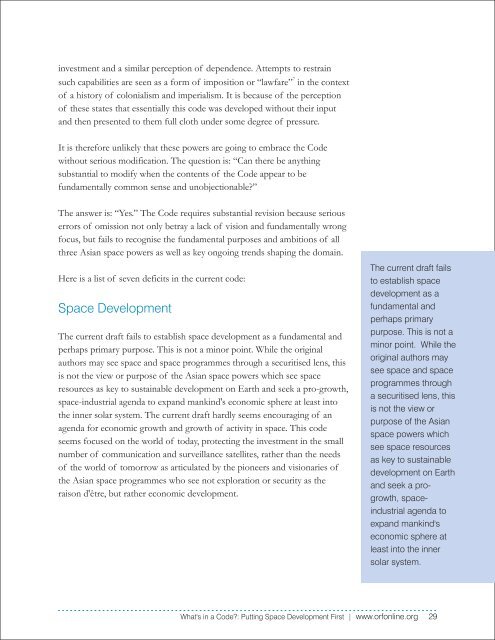AwaitingLaunch_1397728623369
AwaitingLaunch_1397728623369
AwaitingLaunch_1397728623369
Create successful ePaper yourself
Turn your PDF publications into a flip-book with our unique Google optimized e-Paper software.
investment and a similar perception of dependence. Attempts to restrain<br />
7<br />
such capabilities are seen as a form of imposition or “lawfare” in the context<br />
of a history of colonialism and imperialism. It is because of the perception<br />
of these states that essentially this code was developed without their input<br />
and then presented to them full cloth under some degree of pressure.<br />
It is therefore unlikely that these powers are going to embrace the Code<br />
without serious modification. The question is: “Can there be anything<br />
substantial to modify when the contents of the Code appear to be<br />
fundamentally common sense and unobjectionable?”<br />
The answer is: “Yes.” The Code requires substantial revision because serious<br />
errors of omission not only betray a lack of vision and fundamentally wrong<br />
focus, but fails to recognise the fundamental purposes and ambitions of all<br />
three Asian space powers as well as key ongoing trends shaping the domain.<br />
Here is a list of seven deficits in the current code:<br />
Space Development<br />
The current draft fails to establish space development as a fundamental and<br />
perhaps primary purpose. This is not a minor point. While the original<br />
authors may see space and space programmes through a securitised lens, this<br />
is not the view or purpose of the Asian space powers which see space<br />
resources as key to sustainable development on Earth and seek a pro-growth,<br />
space-industrial agenda to expand mankind's economic sphere at least into<br />
the inner solar system. The current draft hardly seems encouraging of an<br />
agenda for economic growth and growth of activity in space. This code<br />
seems focused on the world of today, protecting the investment in the small<br />
number of communication and surveillance satellites, rather than the needs<br />
of the world of tomorrow as articulated by the pioneers and visionaries of<br />
the Asian space programmes who see not exploration or security as the<br />
raison d'être, but rather economic development.<br />
The current draft fails<br />
to establish space<br />
development as a<br />
fundamental and<br />
perhaps primary<br />
purpose. This is not a<br />
minor point. While the<br />
original authors may<br />
see space and space<br />
programmes through<br />
a securitised lens, this<br />
is not the view or<br />
purpose of the Asian<br />
space powers which<br />
see space resources<br />
as key to sustainable<br />
development on Earth<br />
and seek a progrowth,<br />
spaceindustrial<br />
agenda to<br />
expand mankind's<br />
economic sphere at<br />
least into the inner<br />
solar system.<br />
What's in a Code?: Putting Space Development First | www.orfonline.org 29








